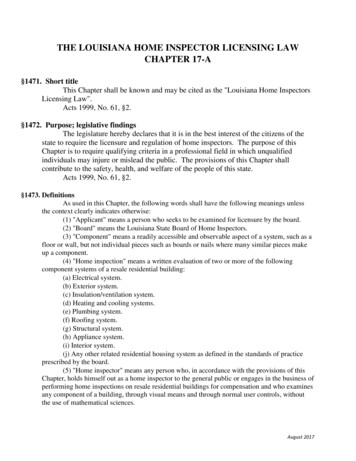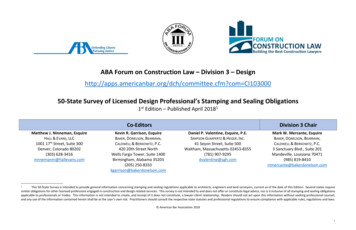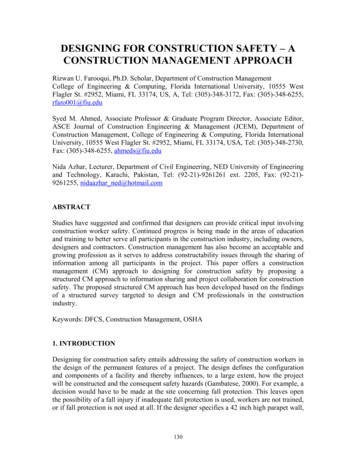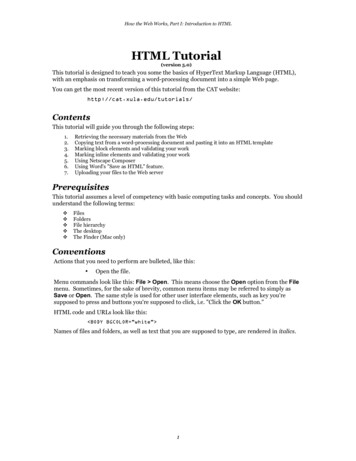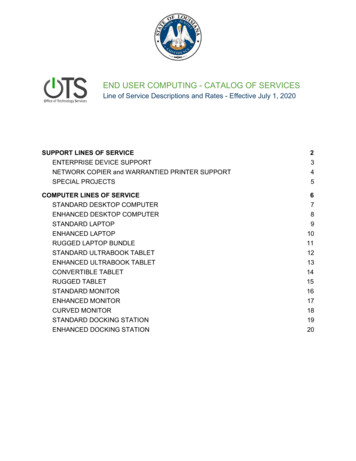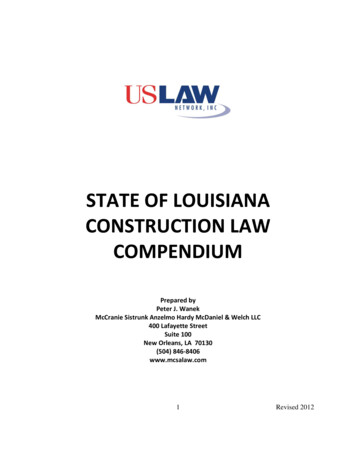
Transcription
STATE OF LOUISIANACONSTRUCTION LAWCOMPENDIUMPrepared byPeter J. WanekMcCranie Sistrunk Anzelmo Hardy McDaniel & Welch LLC400 Lafayette StreetSuite 100New Orleans, LA 70130(504) 846-8406www.mcsalaw.com1Revised 2012
This outline is intended to provide a general overview of Louisiana Construction Law.The volume of discussion on any particular topic is not necessarily an indication of the amountof litigation related to that area of Louisiana construction law. Much of Louisiana law isgoverned by the Louisiana’s Civil Code and Revised Statutes, with case law serving asinterpretations of the codal/statutory articles.BREACH OF CONTRACTTo form a valid and enforceable contract under Louisiana law, there must be capacity ofthe parties to contract, consent of the parties to the contract, a lawful cause or consideration, anda certain object that forms the subject matter of the agreement. A breach of contract isperforming some act inconsistent with the terms of the contract. For example, if a contractorrefuses to perform obligations and leaves the job site, then those actions are considered an activebreach of contract. White v. Boutte, 392 So. 2d 124 (La. App. 1st Cir. 1980). There can also bea passive breach ofcontract which is the failure to do what was agreed to be done, the failureto perform timely, or the failure to perform in the manner stipulated. Southern Const. Co. v.Housing Authority of Opelousas, 197 So. 2d 628 (La. 1967).A contractor, subcontractor, owner, supplier, or any party to a construction contract isliable for the damages caused by the failure to perform a contractual obligation. Failure toperform may result from non-performance, defective performance, or a delay in performance.La. Civ. Code art. 1994. The remedies for a breach of contract include either specificperformance or damages, or a combination of both if applicable. La. Civ. Code art. 1986.The purpose of contract damages is to place the non-breaching party in the position hewould have been in had there been no breach of contract. Therefore, contract damages consist ofthe actual loss sustained by the non-breaching party, and the lost profits of which the breachingparty has been deprived. La. Civ. Code art. 1995. In a construction context, lost profits areusually calculated by taking the gross revenues that would have been received if there were nobreach, and deducting from that the variable expenses that would have been incurred. Fixedcosts such as overhead and depreciation are not deducted from gross revenues when determininga damage award. Rosbottom v. The Office Lounge, Inc., 94-894 (La. App. 3d Cir. 4/5/95), 654So. 2d 377.Specific performance is rarely a remedy in construction cases. If a contractor fails toperform or renders defective performance, it is unlikely than the owner will want the court toorder the same contractor to continue the work. Instead, contract damages are the primaryremedy in construction cases. A detailed discussion of delay damages is provided below.NEGLIGENCEGenerally, a contractor must complete the work in a good and workmanlike manner, sothat it will be suitable for its intended purpose and free from defects in workmanship ormaterials. A contractor may be liable for damages if the evidence shows he/she did not possess2Revised 2012
the necessary skill, efficiency or knowledge, or did not exercise ordinary care in performing thework. However, a contractor is not responsible for defects caused by faulty or insufficientspecifications furnished to the contractor, provided that the specifications were not his own.La.R.S. 9:2771. This provision shall apply regardless of whether the defect occurs or becomesevident prior to or after acceptance of the work by the owner. La.R.S. 9:2771. This is statutoryprotection cannot be waived in a contract.Nevertheless, the contractor may still be subject to liability under third-party tort claims.To avoid third-party liability, the contractor must show that either the situation created was nothazardous or that the contractor had no reason to know that it created a hazardous situation.Bernard v. La. DOTD, 640 So. 2d 694 (La. App. 3d Cir. 1994).The Louisiana Civil Code make a “undertaker,” e.g. contractor/architect “bear the loss: ifa building he or she undertakes to make falls into ruin within a specified period, either in wholeor in part, on account of “badness of the workmanship.” The period for liability differs betweenstone/brick buildings and wood/wood-framed buildings with brick facades. Stone/brickbuildings have a 10-year preemptive period; wood/wood-framed buildings have a 5-year period.La.C.C. art. 2762. It is well-established Louisiana law that implied in every building contract isan obligation on the part of the contractor to perform the work in a good, workmanlike manner,free from defects in either materials or workmanship. Cell-O-Mar, Inc. v. Gros, 479 So. 2d 386(La. App. 1st Cir. 1985).The general measure of damages for breach of the implied warranty of goodworkmanship is the cost of repairs if the work can be repaired. If the work is so defective as torender it useless, the measure of damages is the sum of the return of all contract payments, thecost to remove the defective structure, and the cost of returning the property on which theconstruction occurred to its pre-construction state. Morton Buildings, Inc. v. Redeeming Wordof Life Church, Inc., 1997-2251 (La. App. 1 Cir. 11/6/98), 744 So. 2d 5.BREACH OF WARRANTYThe New Home Warranty Act, provides special warranties and remedies when a newhome is defective. La. R.S. 9:3141 et seq. The purpose of the act is to promote commerce inLouisiana by providing clear, concise, and mandatory warranties for the purchasers andoccupants of new homes in Louisiana. La. R.S. 9:3141. Section 3144 of the Act sets forth theapplicable warranties and time periods wherein the contract warrants that the various elements ofthe home will remain free of defects caused by noncompliance with building standards. Forexample, under the New Home Warranty Act, the contractor warrants the house will be free ofany defect in materials or workmanship not regulated by the building standards, or warrants thatit will be free from any defect due to noncompliance with the applicable building standards, for aperiod of one year. La.R.S. 9:3144(A)(1). The contractor warrants that the new home will befree of any defects in plumbing, electrical, heating, cooling and ventilating for two years. La.R.S. 9:3144(A)(2). The contractor warrants that the new home will be free from majorstructural defects for five years. La.R.S. 9:3144(A)(3). Pursuant to section 3150 the NHWA is3Revised 2012
the exclusive remedy when the cause of action arises from construction defects, violations of thebuilding code, or poor workmanship. The NHWA does not cover the cost of completion of ahome where the builder fails to complete the job. Such damages are usually addressed in abreach of contract claim. Thorn v. Caskey, 745 So. 2d 653, (La. App. 2d Cir. 9/22/99).To avail himself of the recovery under the NHWA, the owner must provide the contractorwritten notice, by registered or certified mail, within one year of acquiring knowledge of thedefect and give the contractor the opportunity to repair the defect before attempting the repairhimself or filing suit. La.R.S. 9:3145. Additionally, any action to enforce any warrantyprovided in the Act shall be subject to a Aperemptive period@ of thirty days after the expirationof the appropriate warranty time period. La.R.S. 9:3146. APeremption@ is a concept verysimilar to liberative prescription (discussed below) in that both provide a certain time periodwithin which a right must be exercised to avoid forfeiture of that right. Assuming statutoryentitlement and compliance with all procedural requirements, the owner will also be able torecover actual damages, including attorney s fees and court costs, arising out of the violation.La.R.S. 9:3149.Louisiana’s Public Works ActLouisiana Revised Statute, 38:2212 provides that public construction work valued above 100,000 (with a few exceptions) must be advertised and awarded to the lowest bidder who bidaccording to the contract, plans, and specifications as advertised. The Public Works Actprovides protection to claimants who have been hired by a general contractor for the constructionor repair of public works. Potential claimants include any person to whom money is duepursuant to a contract with a contractor or subcontractor for doing work, performing labor, orfurnishing materials or supplies. The Public Works Act requires the general contractor to obtaina bond which secures its obligation to pay claimants. It should be noted that this statute is nottechnically a lien or privilege because public property cannot be subject to lien claims.Subcontractors and laborers generally have contractual privity with the generalcontractor. In other words, should there be any breach of contract between the general contractorand various subcontractors, the subcontractors can pursue a claim against the general contractorto enforce the rights under the contract. However, subcontractors rarely have any such claimagainst the governing authority of a public works contract. The Public Works Act provides amethod by which subcontractors and laborers can obtain payment from the primary source offunds, the governing authority, rather than the secondary source of funds, the general contractor.Basically, the Act provides a measure of protection to those who have no contractual relationshipwith the governing authority and no control over the funds advanced by the authority to thegeneral contractor during construction of the project.If any legal contest arises from a Public Works contract, they all must take place in aLouisiana Court applying Louisiana law. Louisiana Revised Statute 38:2196 declares null and4Revised 2012
void and unenforceable as against public policy any provision in a Public Works contract thatdeclares a suit or arbitration proceeding must be brought in a forum or jurisdiction outside ofLouisiana and/or requires the agreement to be interpreted according to the laws of anotherjurisdiction. The State or a political subdivision can waive this prohibition of enforceability if todo so would be in the best interests of the State or political subdivision.Louisiana Private Works ActSimilar to the Public Works Act, the Louisiana Private Works Act provides generalcontractors and subcontractor with a remedy against the owner if not compensated for work. Asto general contractors, for projects reasonably estimated to exceed 25,000 in costs, an absoluteprerequisite to the privileges afforded under the Act is that a notice of contract must be filed withthe recorder of mortgages prior to the commencement of work. La.R.S. 9:4811 & 4831. Forsubcontractors this act allows a lien in their favor despite the lack of formal contract with theowner. In order to preserve a claim or privilege, Louisiana Revised Statute 9:4822(A). If not,subcontractors must file a lien within 60 of the filing of a notice of termination or the substantialcompletion of the job. La.R.S. 9:4822(C). A general contractor must also file within this timeperiod. La.R.S. 9:4822(B). The time period for filing is mandatory and the claimant bears theburden of providing the claim was filed timely. If the Private Words Act lien was not filedwithin the requisite time period, then the claimant cannot avail itself of the right provided in theAct.Substantial completion implies that the job is totally completed with no more work to bedone or supplies delivered, or when there is only punch-list work remaining. Substantialcompletion also includes the situation when an owner terminates the work done on a specificportion or area, or the work of a particular contractor.Suppliers of materials for residential purposes must satisfy the additional burden ofproviding timely notice of non-payment to the owner at least ten days prior to filing a claim.Additionally, a supplier to another supplier does not have these rights under the Private WorksAct. That is, to have rights under this Act, a supplier must sell directly to a subcontractor or acontractor. Cable & Connector Warehouse, Inc. v. Omnimark, Inc., 700So.2d 1273 (La. App. 4Cir. 9/12/97).Despite the protection provided to subcontractors and suppliers who qualify under thePrivate Works Act, the owner can relieve itself of personal liability and protect the property frompotential liens by assuring alternate security is available. La.R.S. 9:4802(C). This requires thetimely filing of written notice and the use of a payment bond. The payment bond must bemaintained with a solvent legal surety or guarantor and the amount varies from 100% of thecontract price if less than ten thousand dollars to 25% for contracts over one million dollars. La.R.S. 9:4812(B).5Revised 2012
LIBERATIVE PRESCRIPTIONLiberative prescription is the functional equivalent in Louisiana to the statute oflimitations in other states. A prescriptive period is the period of time within which an aggrievedparty must file suit to protect his/her rights. The Louisiana Civil Code provides that an actionagainst a contractor or an architect on account of defects of construction, renovation, or repair ofbuildings and other works is subject to a liberative prescription of ten years. La.C.C art. 3500.Parties may contract to shorten the codal prescriptive period.MISREPRESENTATION AND FRAUDAn owner may make a claim against a builder based on fraud. Under Louisiana law,fraud is defined as a misrepresentation or suppression of the truth made with the intention ofadvantaging oneself or disadvantaging another. La.C.C art. 1953. It is important to note thatfraud can, and often does result from silence or inaction. However, La.R.S. 9:2772 creates a 5year preemptive period within which an owner must bring an action against acontractor/architect/designer for any deficiencies in a subject immovable (La. Civil Code termfor an improvement on a property) including deficiencies known to a contractor, etc., but neverrevealed to the owner. This period begins accruing after the owner registers his ownership of theimmovable or, if the owner does not register within 6 months of occupying the immovable, thedate upon which the owner began occupying the structure.DELAY DAMAGESDelay claims are damages over and above the direct costs expended to remedy the causeof the delay, whether it be change orders, defective specifications, or differing site conditions.To prove entitlement to delay damages, a contractor will generally try to show that the delayimpacted the Acritical path.@ Any delay of an item of work on the Acritical path@ will cause theproject to be completed later than if the item was completed on time.Some delays are not compensable at all. For example, most contracts exclude delaydamages occasioned by Acts of God or bad weather. Rather than actual delay damages, thecontractor is given an extension of time to complete the project. Aside from these excusabledelays, Louisiana Civil Code article 2769 provides generally that if a contractor or subcontractorfails to do the work he has contracted to do, or if he does not execute it in the manner and at thetime he has agreed to do it, he should be liable in damages for the losses that may result from hisnon-compliance with the contract.A common provision in construction contracts is the Ano damages for delay@ clausewhich purports to prevent the contractor from recovering monetary damages for delays causedby the owner or the owner’s representatives such as architects. These provisions are common inform subcontracts utilized by many general contractors. Generally, Louisiana courts upholdthese clauses but some have refused to enforce a Ano damages for delay@ clause where the delay6Revised 2012
was not of a kind anticipated by the parties, or was caused by bad faith or active interference.The Louisiana Public Works Act prohibits Ano damages for delay@ clauses on contractsgoverned by the Louisiana Public Works Act.RECOVERABLE DAMAGESIn construction defect and breach of contract claims, certain items of damages arerecoverable under Louisiana law assuming the damages can be proven with reasonable certainty.For example, Louisiana courts have awarded out of pocket expenses, Salard v. Jim WalterHomes, Inc., 563 So. 2d 1327 (La. App. 3d Cir. 1990), and loss of rental income, Guy T.Williams Realty, Inc. v. Shamrock Constr. Co., 564 So. 2d 689 (La. App. 5th Cir. 1990).Attorney’s FeesAttorney s fees are not recoverable damages in the absence of a statute or contractprovision authorizing the recovery of such expenses as damages. Parties are allowed to contractwith respect to attorney fees. Such a contract does not violate public policy.Investigation CostsRecovery of investigation costs is usually determined by the terms of the contract itself.Louisiana courts have upheld the reimbursement of costs associated with the investigation intoaccidents involving subcontractors as long as the costs were material to determining the cause ofthe workplace accident.Emotional DistressLouisiana law does not generally recognize an independent cause of action for negligentinfliction of emotional distress. Moresi v. Dept. of Wildlife, 567 So. 2d 1081 (La. 1990). InSanders v. Zeagler , the Louisiana Supreme Court overturned a trial court s award of emotionaldistress damages holding that the intellectual gratification of the homeowner did not rise to thelevel of being the principal object of contract. Sanders v. Zeagler , 686So.2d 819 (La. 1/14/97).Nevertheless, there is some indication that Louisiana courts are willing to award emotionaldistress damages where there is a significant non-pecuniary interest involved. See Young v.Ford Motor Co., 595 So. 2d 1123 (La. 1992).Mitigation of DamagesA party to a contract must make a reasonable effort to mitigate its damages caused by theother party s breach of contract. La. Civ. Code art. 2002. When an owner or contractor allowsunnecessary or unreasonable damages to result from a compensable delay, breach of contract, ordefect claim, the unnecessary or unreasonable damages can be challenged and will not beincluded in a damage award.7Revised 2012
LIENSIf a construction project is residential, then the Residential Truth in Construction Actrequires the general contractor to give the owner written notice of lien rights that may be assertedagainst them and of actions the owners may take to protect themselves against liens. La.R.S. 9:4851 et seq Louisiana Revised Statute 9:4855 grants the owner a claim for damages andattorney s fees if the contractor fails to comply with the Act.Under the Private Works Act, if the general contractor fails to file a notice of contractprior to starting work on the project, then the general contractor loses its lien rights. If thegeneral contractor does file a notice of contract prior to starting work, then the general contractormust file its lien within 60 days of the filing of substantial completion on the project. La.R.S.9:4822(B). Subcontractors and suppliers have 30 days from substantial completion to file a lienif the general contractor filed a notice of contract. La.R.S. 9:4822(A). However, if the generalcontractor failed to file a notice of contract, then subcontractors and suppliers have 60 days fromsubstantial completion to file their liens. La.R.S. 9:4822(C).Because public property cannot be subject to a lien, the Public Works Act requires ageneral contractor to post bond. Subcontractors and suppliers can file a Astatement of claim@ onthese projects (and their attached bonds) and the resultant financial protection is similar to whensubcontractors or suppliers file liens on private jobs where the owner has posted a bond.INSURANCE COVERAGEIn Louisiana, insurance law is sui juris or subject to its own set of rules and regulations.Insurance principles are not necessarily applicable to other contractual
The New Home Warranty Act, provides special warranties and remedies when a new home is defective. La. R.S. 9:3141 et seq. The purpose of the act is to promote commerce in Louisiana by providing clear, concise, and m
